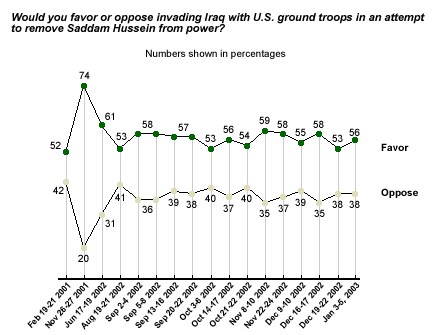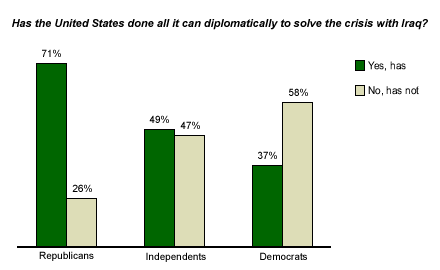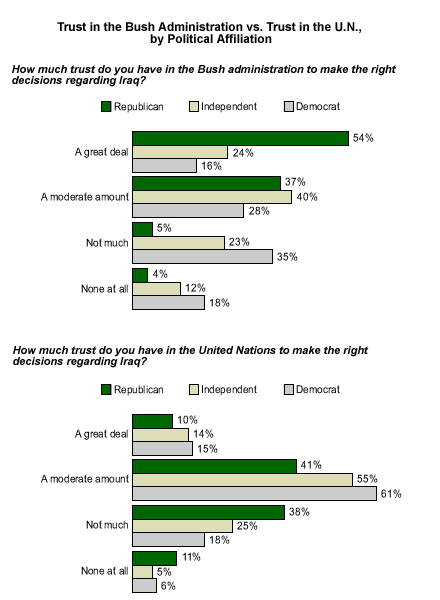The notion of war tends to politicize the American public like few other issues can. The current situation in Iraq is no exception, as political partisanship is clearly related to public opinion on the subject.
In the most recent CNN/USA Today/Gallup poll, conducted Jan. 3-5, just over half of Americans (56%) say they are in favor of invading Iraq with ground troops in an attempt to remove Saddam Hussein from power, while 38% were opposed*. The percentage in favor of taking such action has remained consistent in the mid-50% range since August 2002. Support was higher (74%) shortly after the Sept. 11 terrorist attacks.

Invasion Variables
Responses to this question vary dramatically by political affiliation (as examined from a Dec. 9-10 Gallup Poll, the last time the question was asked of a full sample, though the general patterns hold in subsequent polls)**. Republicans, who typically tend to be more hawkish, heavily favor a U.S. invasion to remove Saddam from power, by 72% to 22%. Among Democrats, however, more than half oppose invading (54%) and little more than a third favor the idea (40%). Political independents are more evenly divided, with 52% in favor and 42% opposed.
The idea that Iraq may be harboring weapons of mass destruction is a major factor affecting public support for a possible invasion. When Gallup asked Americans if they support invading Iraq in an "attempt to remove Iraq's weapons of mass destruction or programs to develop them," a majority of the public is also in favor the idea. Specifically, 58% favor invasion when the question is asked this way, while 33% are opposed.
Partisan differences are also evident on this question, though not quite as pronounced. When weapons of mass destruction are mentioned, Republicans favor invasion by 71% to 16%. Democratic opinion is evenly divided, with 46% in favor and 46% opposed.
Politics of Diplomacy
Recently, the extent to which the United States has tried to use diplomacy to solve the crisis with Iraq has been called into question. To some military and political analysts, war with Iraq seems inevitable, and some of President Bush's critics believe he has already resolved to go to war. Bush has bristled at that assertion and continued to imply that the opportunity to avoid war is in Saddam's hands.
Americans are fairly divided on this question, and again there is large variance along party lines. Roughly half of the public (52%) thinks the United States has done all it can to solve the crisis with Iraq diplomatically, while 44% believes it has not***. Republicans are more apt to say the United States has exhausted diplomatic options (71% to 26%), while political independents are evenly divided on the subject (49% to 47%), and Democrats are more likely to say that the United States has not done all that it can diplomatically (37% to 58%).

Bush vs. the United Nations
The role of the United Nations is also an important factor in public opinion of the situation, since any Iraqi weapons development would be a violation of U.N. treaties, and the public is much more likely to support military action against Iraq with U.N. approval. A Sept. 20-22 CNN/USA Today/Gallup poll found 79% of Americans favoring military action against Iraq if the United Nations supported an invasion****. This includes 93% support among Republicans, 78% among independents and 69% of Democrats.
Almost a third of Americans say they have "a great deal" of trust that the Bush administration will make the right decisions regarding Iraq and another 34% have "a moderate amount" of trust. Just 13% have "a great deal" of trust that the United Nations will make the right decisions regarding Iraq, while 52% have "a moderate amount." Again, partisanship greatly influences public opinion on this issue. Republicans are much more likely than Democrats to express trust in the Bush administration on this subject. Along those same lines, Democrats are significantly more likely than Republicans to say they trust the United Nations "a great deal" or "a moderate amount."

*Results are based on telephone interviews with 1,000 national adults, aged 18 and older, conducted Jan. 3-5, 2003. For results based on the total sample of national adults, one can say with 95% confidence that the maximum margin of sampling error is ±3%.
**Results are based on telephone interviews with 1,009 national adults, aged 18 and older, conducted Dec. 9-10, 2002. For results based on the total sample of national adults, one can say with 95% confidence that the maximum margin of sampling error is ±3%.
***Results based on telephone interviews conducted with 512 adults, aged 18 and older, conducted Dec. 19-22, 2002. For results based on the total sample of national adults, one can say with 95% confidence that the maximum margin of sampling error is ±5%.
****Results based on telephone interviews conducted with 1,010 adults, aged 18 and older, conducted Sept. 22-24, 2002. For results based on the total sample of national adults, one can say with 95% confidence that the maximum margin of sampling error is ±3%.
